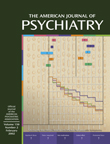Benzodiazepine Discontinuation in Generalized Anxiety Disorder
To the Editor: In an interesting study, Kark Rickels, M.D., et al. (1) demonstrated the usefulness of imipramine in a benzodiazepine discontinuation program for patients with generalized anxiety disorder. Low anxiety scores (Hamilton Anxiety Rating Scale score: mean=12.5, SD=6.3) at baseline and at the 12-month follow-up and the fact that only 11 (21.2%) of 52 patients required pharmacotherapy (tricyclic antidepressants or selective serotonin reuptake inhibitors) to treat their anxiety symptoms makes one suspect that the majority of the subjects had either a mild form of generalized anxiety disorder or benzodiazepine dependence. This poses a limitation on the generalizability of the results. Maintenance therapy for generalized anxiety disorder is recommended for at least 1 year after control of anxiety symptoms has been achieved (2), and benzodiazepine dependence is known to occur at therapeutic doses (3).
Dr. Rickels et al. considered the study group “rather treatment resistant” (1, p. 1978) on the basis of previous discontinuation attempts. However, these attempts were without any apparent therapeutic intervention. The use of nonpharmacological and pharmacological measures is an important factor in determining the success of benzodiazepine discontinuation (3). The dissatisfaction of the majority of the patients (75.7%) with benzodiazepine therapy for the management of anxiety may have been a motivating factor in these discontinuation attempts. Another argument against treatment resistance is the benzodiazepine-free status of 37.5% of the patients after 3 months of taking placebo alone.
We notice certain issues regarding the methods that might have had a bearing on the results of this study. It was not clarified in the article how the subjects were assigned to three study groups and whether random assignment was carried out to reduce rater or response bias. Moreover, the patients taking imipramine experienced side effects that could have compromised the study blind. The description of the 12-month follow-up assessment contains no mention of the differences among the three treatment groups regarding their benzodiazepine-free status. Logistic regression analysis showed that lower levels of baseline anxiety symptoms predicted a successful taper at 3 months. Baseline depressive symptoms were not analyzed, even though both anxiety and depressive symptoms were hypothesized to play an important part in benzodiazepine withdrawal (1). The 41.2% (seven of 17) of patients taking benzodiazepines at 3 months but not at 12 months might actually be lower, since the patients taking benzodiazepines at 3 months were more likely to drop out of follow-up by 12 months than the benzodiazepine-free patients (odds ratio=3.7).
Notwithstanding issues regarding conception and methods, this study opens up new avenues in tackling benzodiazepine dependence in long-term benzodiazepine users.
1. Rickels K, DeMartinis N, García-España F, Greenblatt DJ, Mandos LA, Rynn M: Imipramine and buspirone in treatment of patients with generalized anxiety disorder who are discontinuing long-term benzodiazepine therapy. Am J Psychiatry 2000; 157:1973-1979Link, Google Scholar
2. Papp LA: Anxiety disorders: somatic treatment, in Comprehensive Textbook of Psychiatry. Edited by Sadock BJ, Sadock VA. Philadelphia, Lippincott Williams & Wilkins, 2000, pp 1490-1497Google Scholar
3. Juergens SM: Benzodiazepines and addiction. Psychiatr Clin North Am 1993; 16:75-86Crossref, Medline, Google Scholar



